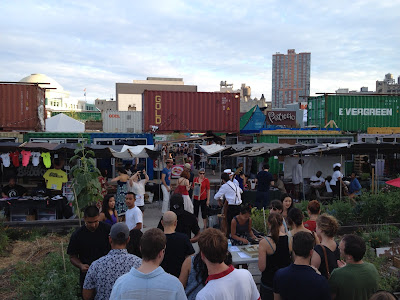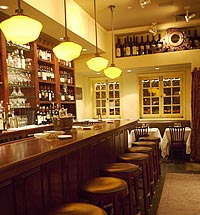 Last week (yeah, I'm behind on these) Ed and I went to see a show I've had my eye on for ages, Sleep No More. I was told it was an interpretation of Shakespeare's Macbeth and that it was interactive and that you walked around an old hotel and that everyone who saw it seemed to love it. An email I got after purchasing the tickets warned attendees to wear comfortable shoes. I knew little more than this as we waited in line outside the "theater," whose sign said it was actually called the McKittrick Hotel. I learned later that the hotel was actually an abandoned warehouse until the theater company (Punchdrunk, from England) transformed it. Our IDs were checked and our hands were stamped, and we were let through the front door in small groups. The entryway looked like a hotel, albeit a very old one, and we were given our "room keys" (actually playing cards) at the check-in window and wished a pleasant stay by the staff. Then a small group of ticketed guests were let into a dark corridor. It was virtually pitch black, and we bumped into walls and each other stumbled forward, between the winding walls. It felt like being in a haunted house. Suddenly, there was red light and music and we found ourselves abruptly in a crowded jazz club filled with small tables and other guests. People were buying drinks from the bar, but before Ed and I had time to do this, the numbers on our cards were called. Or, rather, his number was called. I decided to try to sneak in with him, and as it turned out, our numbers weren't even checked. A very dramatic woman dressed in a sultry, Medieval-style gown led us into a small room and distributed white masks. She told us that there was no talking, cell phones, or holding hands (Ed and I shut up and dropped hands immediately). She told us to leave our masks on at all times, and that people stationed throughout the hotel in black masks would assist us if we needed help, then herded us onto an elevator. The elevator operator told us that this show was best experienced alone (yeah right; I was not about to split off from Ed), and that "fortune favored the bold." Then he stopped the car and opened the door. I followed several people out, but to my surprise, when I turned around there was no one behind me and the elevator door had shut.
Last week (yeah, I'm behind on these) Ed and I went to see a show I've had my eye on for ages, Sleep No More. I was told it was an interpretation of Shakespeare's Macbeth and that it was interactive and that you walked around an old hotel and that everyone who saw it seemed to love it. An email I got after purchasing the tickets warned attendees to wear comfortable shoes. I knew little more than this as we waited in line outside the "theater," whose sign said it was actually called the McKittrick Hotel. I learned later that the hotel was actually an abandoned warehouse until the theater company (Punchdrunk, from England) transformed it. Our IDs were checked and our hands were stamped, and we were let through the front door in small groups. The entryway looked like a hotel, albeit a very old one, and we were given our "room keys" (actually playing cards) at the check-in window and wished a pleasant stay by the staff. Then a small group of ticketed guests were let into a dark corridor. It was virtually pitch black, and we bumped into walls and each other stumbled forward, between the winding walls. It felt like being in a haunted house. Suddenly, there was red light and music and we found ourselves abruptly in a crowded jazz club filled with small tables and other guests. People were buying drinks from the bar, but before Ed and I had time to do this, the numbers on our cards were called. Or, rather, his number was called. I decided to try to sneak in with him, and as it turned out, our numbers weren't even checked. A very dramatic woman dressed in a sultry, Medieval-style gown led us into a small room and distributed white masks. She told us that there was no talking, cell phones, or holding hands (Ed and I shut up and dropped hands immediately). She told us to leave our masks on at all times, and that people stationed throughout the hotel in black masks would assist us if we needed help, then herded us onto an elevator. The elevator operator told us that this show was best experienced alone (yeah right; I was not about to split off from Ed), and that "fortune favored the bold." Then he stopped the car and opened the door. I followed several people out, but to my surprise, when I turned around there was no one behind me and the elevator door had shut. |
| A room on the top floor. |
Soon, I determined that I'd seen the whole floor. I found a stairwell, but the ascending stairs were roped off. I figured this meant I was at the top, and was relieved that this would make my walk-through systematic. I went down a level, and found I was in a completely different place. There was a room filled with structures made from cardboard boxes, and here I saw my first actor. It was easy to tell he was part of the show because he was not wearing a mask. He was dressed to fit the period, the 1920's I estimated, and, with the first sound I'd heard all evening in the background (a scratchy recording of "Guilty"), was carefully folding a suit jacket on a pool table. (Yes, there was a pool table in the middle of what looked like a hobo camp.) Other masked figures watched him silently, following him around the room. I couldn't figure out what he was doing, so I left. I found a dark, misty room filled with skinny, leafless trees arranged in a sort of maze. I wondered if this represented the Woods of Birnam from the play. It was too dark to see my watch, but I estimated I'd been in the hotel at least 20 minutes and had yet to see anything that reminded me of Macbeth.
There were also abandoned shops set up, and I wandered into a candy shop, a shop full of dusty old sewing
 |
| The hotel lobby |
As I wandered through the trees, a man in a white mask walked toward me, and it took me a few moments to realize it was Ed. I widened my eyes at him, and we walked around a bit more. We saw a man carrying a door across his back. Ed pulled my aside and whispered that it was starting to repeat, as he'd seen that scene before. Either way, we'd been in the hotel for about two hours, and were getting hungry and increasingly confused. So we wandered around until, in rush of sound and light, we found ourselves in the jazz club again. It had seemed dim and vaguely foreboding when we first saw it, but now it appeared bright and welcoming. Able to talk at last, we removed our masks and headed for the door. I overheard a staff member, trying to talk other guests into buying a book about the show, say that there were about 14 hours of content in the show, and that many people came to see it multiple times, following different characters to ensure they'd experience it all. The world outside the hotel seemed warm and friendly. Ed and I went to a pizza place, and I learned that he had seen none of the same scenes I had, though we'd gone into almost all of the same rooms. In the room with the bathtub, he'd seen a bloody Macbeth strip naked while Lady Macbeth bathed and comforted him. (I'd come across the tub again later in the show and noticed that it was bloody.) We discovered that we'd made some of the same conclusions about who was who, but that neither of us could explain most of the show.
 |
| Lady Macbeth comforts Macbeth after he slays Duncan (I think) |
 I wanted to see Sleep No More because I love Shakespeare. I enjoyed it very much, but I don't think it necessarily fit into the "Shakespeare" category; it followed a lot of the same themes, but there was just too little that was an obvious tie-in. Still, the performance was a pretty incredible experience. The intricacy of the set alone was worth seeing, and while I wasn't always sure what the actors were doing, I was impressed by how well they did it. I loved the masks and the silence. It made the whole place feel eerie, and kept people's expressions invisible. It seemed that each of the characters was being watched by a crowd of inescapable, silent judges, which is fitting because the play is all about guilt. Brilliant. I'd certainly recommend it, though not for the faint of heart, or to anyone averse to walking. I don't think I'd go to see it again, but it's a unique experience that I think almost anyone should see once.
I wanted to see Sleep No More because I love Shakespeare. I enjoyed it very much, but I don't think it necessarily fit into the "Shakespeare" category; it followed a lot of the same themes, but there was just too little that was an obvious tie-in. Still, the performance was a pretty incredible experience. The intricacy of the set alone was worth seeing, and while I wasn't always sure what the actors were doing, I was impressed by how well they did it. I loved the masks and the silence. It made the whole place feel eerie, and kept people's expressions invisible. It seemed that each of the characters was being watched by a crowd of inescapable, silent judges, which is fitting because the play is all about guilt. Brilliant. I'd certainly recommend it, though not for the faint of heart, or to anyone averse to walking. I don't think I'd go to see it again, but it's a unique experience that I think almost anyone should see once.
.JPG)
.JPG)

.JPG)




.JPG)

.JPG)





.JPG)




.JPG)







